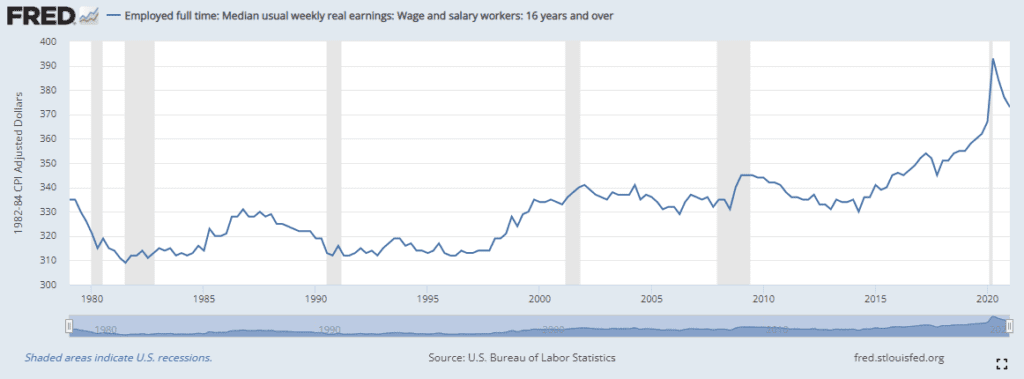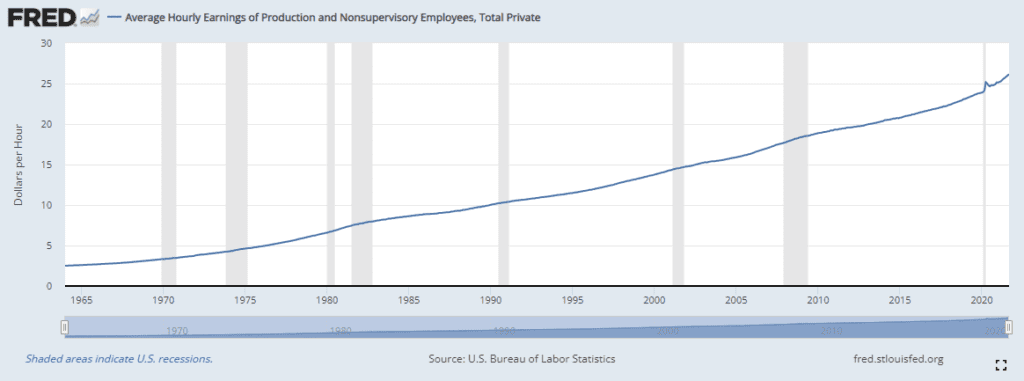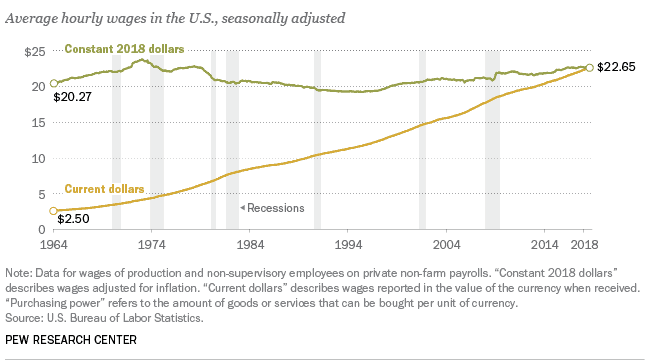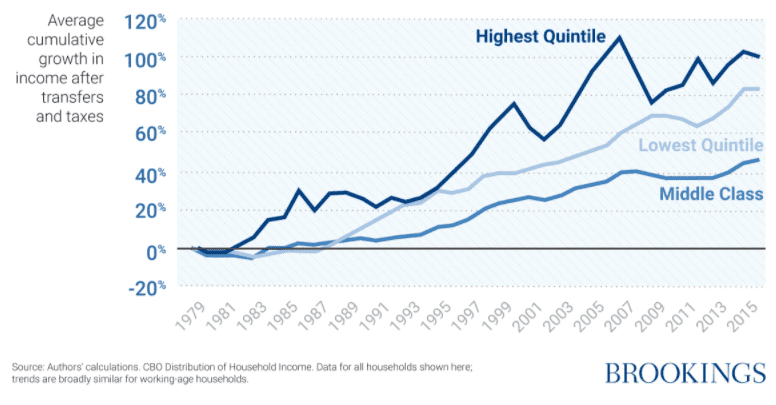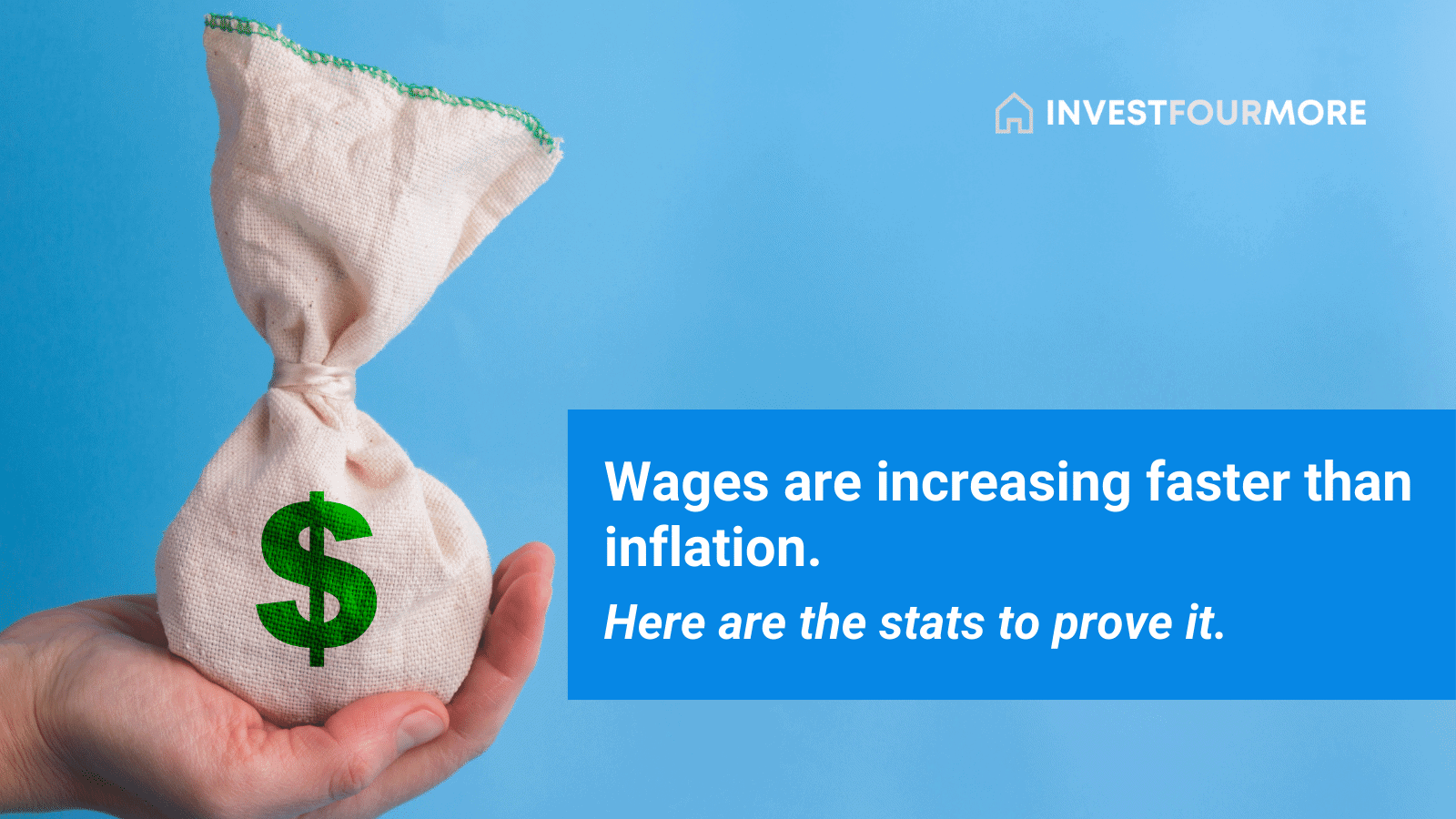
Wages Are Increasing Faster Than Inflation. Here Are the Stats to Prove It.
There has been a lot of talk lately about wages being flat and how people cannot earn a living wage. If you told someone that wages are increasing faster than inflation, you might be laughed at. Many people take these declarations as fact without analyzing the data behind them. How do people come up with these determinations and are they an accurate assessment of what is really happening in the United States? I took these assumptions as fact for many years until I looked at the data and ideas that they were based off. When I looked at the data it was clear that wages are in fact increasing, they are increasing just as fast as the cost of living, if not faster. The problem is that many people are using inflation-adjusted charges to show that wages are flat, but the wages are still going up even with inflation-adjusted data. Another comparison is wages compared to productivity or compared to the 1%. Yes, it is true that wages for the middle class and poor are not rising as fast as the 1%, but that does not mean they are not rising or going up enough to cover the cost of living. Productivity has also increased significantly since the invention of computers. Does an increase in productivity mean that wages should increase just as much? I think they are two separate issues and not very related but others will use that stat to show wages are flat.
Why do people say that wages are flat?
The media and politicians love to say wages are flat because it is then a problem they can solve for people. Politicians and the media need problems to solve to create attention and get people to listen to them. There are numbers and a chart that float around that show wages being flat. You might see something like the one below:
Usually, you will see something like this but they leave off the end that shows wages increasing significantly the last year or two. However, that is not my point here. This chart is adjusted for inflation. This shows weekly wages at $335 in 1979 and at $372 now. Weekly wages were not actually $300 in the 1980s, they were much less, but when you adjust them for inflation they show to be similar to today’s wages. If you look at the actual numbers they look like this:
You may notice I used hourly rate for this chart and I would love to have used weekly but you rarely see the same data with and without adjusting for inflation. But this chart shows actual wage growth that is not adjusted for inflation. Not very flat is it? It went from $6 or $7 an hour to more than 25$ an hour in the same time period as the chart above. What is really interesting is when you can put the two charts together.
Look wages are flat! Yes, they are flat if you look at them being adjusted for inflation. Adjusting for inflation means you are adjusting them for the cost of goods and the cost of living. If you look close, especially more recently, the wages are still going up even after adjusting for inflation. Inflation should show what the cost of living is. As the cost of products and services goes up over time, wages should go up as well so they can afford those items.
My question is if wages are going up faster than inflation and that is not good enough. How much faster than inflation do they need to rise?
How do most people become rich?
Cost of housing
Many people also say that even with wages increasing a lot will say that doesn’t matter because housing costs have increased even higher than inflation. However, that is not exactly true either. It is true that housing prices have increased faster than inflation in the last few decades, but interest rates for home mortgages have decreased significantly. With rates decreasing, it has made the mortgage payment just affordable or more affordable than the 1980s, 1990s, or even 2000s!
The drawback to higher house prices is that the down payments are higher but there are a lot of down payment assistance programs out there to help reduce those costs as well. It still takes some work, savings, and discipline to buy a house but I think that is how it should be!
Wages compared to productivity
The other argument that I hear a lot to show that wages are flat is that they are not keeping up with productivity. This is true as well, but is it important?
The first question to ask is how is productivity measured? We think of productivity as how much people produce or how much they work but is that really what it is? The answer is no. Productivity is measured by prices. By how many hours someone works compared to the price of what they produce sells for. This article does a much better job of explaining it.
https://capitalaspower.com/2020/11/debunking-the-productivity-pay-gap/
If productivity is measured by prices, that means as prices go higher because there is more automation, as computers come into play, productivity will decrease. There are fewer man-hours needed to sell things for more money. Does that mean workers are getting the shaft? To some, that answer may be yes, but to others, it may be the natural evolution of the economy. As technology advances, fewer man-hours are needed to sell the same dollar amount of goods.
Wages compared to the 1%
Another argument is that the wages of the average person are lagging behind the 1%. There is income inequality and that is not a good thing. Again, who decided this was a bad thing? If everyone is getting richer does it matter that the richer are getting richer than the not-so-rich? Some may say yes and some may say no, but I do not think the answer is always absolutely yes.
So yes, the top earners are seeing wages go up at a faster pace, but interestingly enough, the poor are actually seeing higher percentage wage gains than the middle class! Should we want everyone to make the same amount and have the same wage increases or should we be happy that everyone is winning and everyone’s wages are going up?
So is it true that wages are increasing faster than inflation?
Yes. Are wages flat? No, not unless you compare them to inflation and if that is the case then how much higher than inflation should wages be increasing? Should wages keep up with productivity or prices? Should all wages increase by the same amount? After all, those who are at the very top usually take on much more responsibility and risk than those who are working a steady job. If there is no increased reward for taking those risks, will those risks be taken and will things like private space flights or electric cars be produced as they are today?
Join me on The $100M Mission!
Get exclusive updates as I work to own $100M real estate by 2030 in today's market. Whether you're just starting out or already investing, you'll get actionable insights from my real-world deals and setbacks.
Plus, I'll help you set and achieve your own ambitious goals. Transform your financial future - subscribe now for weekly updates.
Together, we'll prove that massive success in real estate is still possible.
